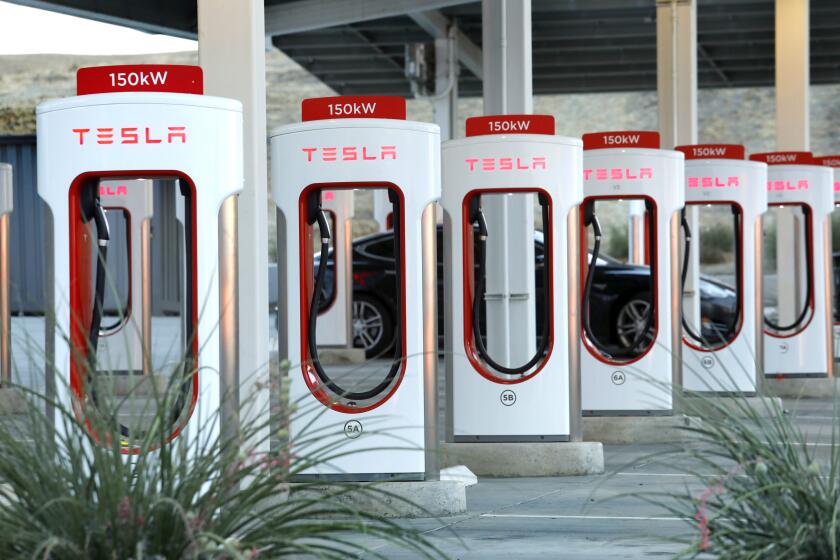California lawsuit seeks to stop USPS plan to buy gas-powered trucks

- Share via
Groups that want the U.S. Postal Service to buy more electric delivery vehicles are suing to halt purchases of thousands of gas-powered trucks as the agency modernizes its mail delivery fleet.
Two lawsuits, filed Thursday in New York and California, ask judges to order a more thorough environmental review before the Postal Service moves forward with the next-generation delivery vehicle program.
Plaintiffs contend that purchases of fossil fuel-powered delivery vehicles will cause environmental harm for decades to come.
“Louis DeJoy’s gas-guzzling fleet guarantees decades of pollution with every postcard and package,” said Scott Hochberg, an attorney with the Center for Biological Diversity, referring to the postmaster general.
One lawsuit was filed by Earthjustice, Center for Biological Diversity, CleanAirNow KC and Sierra Club in San Francisco. Another was filed by the Natural Resources Defense Council and United Auto Workers in New York.
Both target the environmental review underpinning the planned purchase of up to 165,000 next-generation delivery vehicles over the next decade.
The Postal Service defended its actions.
“The Postal Service conducted a robust and thorough review and fully complied with all of our obligations under [the National Environmental Policy Act],” spokesperson Kim Frum said Thursday in an email.
The Postal Service contract calls for 10% of the new vehicles to be electric but the Postal Service contends more electric vehicles can be purchased based on financial outlook and strategic considerations.
In the U.S., the number of EVs on the road has grown faster than the number of public battery chargers.
The percentage of battery-electric vehicles was doubled — to 20% — in the initial $2.98-billion order for 50,000 vehicles.
Environmental advocates contend the Postal Service’s environmental review was inadequate and flawed, and that the contract represented a missed opportunity to electrify the fleet and reduce emissions.
The review process “was so rickety and riddled with error that it failed to meet the basic standards of the National Environmental Policy Act,” said Adrian Martinez, senior attorney on Earthjustice’s Right to Zero campaign.
The Postal Service is in the process of replacing the ubiquitous delivery trucks that went into service between 1987 and 1994.
The new gasoline-powered vehicles would get 14.7 mpg without air conditioning, compared with 8.4 mpg for the older vehicles, the Postal Service said.
All told, the Postal Service’s fleet includes 190,000 local delivery vehicles. More than 141,000 of those are the old models that lack safety features like air bags, anti-lock brakes and backup cameras.
The new vehicles are taller to make it easier for postal carriers to grab packages and parcels that make up a greater share of volume. They also have improved ergonomics and climate control.
Sharp reported from Portland, Maine.
More to Read
Get the L.A. Times Politics newsletter
Deeply reported insights into legislation, politics and policy from Sacramento, Washington and beyond. In your inbox three times per week.
You may occasionally receive promotional content from the Los Angeles Times.











